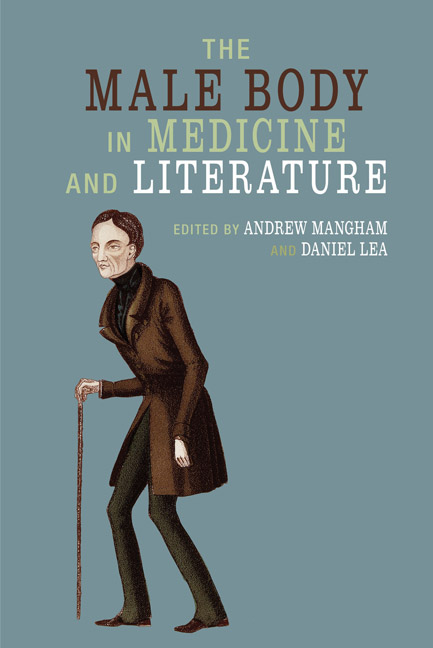Book contents
- Frontmatter
- Contents
- Acknowledgements
- Notes on Contributors
- Introduction
- Part One Enquiry and Experimentation
- 1 The Poetics of Anatomy: John Donne's Dissection of the Male Body
- 2 The Black Male Body in Early African American Science Fiction: The Experimental Case of Sutton Griggs's Imperium in Imperio
- 3 Miserrimus Dexter: Monstrous Forms of the Fin de Siècle
- 4 ‘Intellectual suicides’: The Man of Letters in Middlemarch
- Part Two Wounded and Psychopathologised Bodies
- Part Three Fear, Confusion and Contagion
- Index
2 - The Black Male Body in Early African American Science Fiction: The Experimental Case of Sutton Griggs's Imperium in Imperio
from Part One - Enquiry and Experimentation
- Frontmatter
- Contents
- Acknowledgements
- Notes on Contributors
- Introduction
- Part One Enquiry and Experimentation
- 1 The Poetics of Anatomy: John Donne's Dissection of the Male Body
- 2 The Black Male Body in Early African American Science Fiction: The Experimental Case of Sutton Griggs's Imperium in Imperio
- 3 Miserrimus Dexter: Monstrous Forms of the Fin de Siècle
- 4 ‘Intellectual suicides’: The Man of Letters in Middlemarch
- Part Two Wounded and Psychopathologised Bodies
- Part Three Fear, Confusion and Contagion
- Index
Summary
After the end of the Civil War, the first ‘renaissance’ in African American writing occurred as the United States struggled with what to do about the so-called ‘Negro Problem’: that is, how to integrate the newly freed African Americans into the social landscape of the postbellum United States. Some African American leaders emphasised the ideology of assimilationism, a philosophy that encouraged African Americans to rid themselves of overt racial characteristics and focus instead upon maintaining a middle-class aesthetic that promoted their proximity to whiteness as a method of gaining acceptance by white Americans. However, there were others, such as Martin Delany, who promoted what has been named the philosophy of ‘Black Nationalism’, an ideology that espoused unity of the black races and called for African Americans to separate themselves from white American society as the best solution to the problems of black America during the time.
One such advocate of the ideological stance of Black Nationalism was the writer Sutton E. G riggs. The son of minister Allen Griggs, Sutton Griggs was born in Chatfield, Texas, and was educated at both Bishop College and Richmond Theological Seminary before becoming pastor at Baptist churches in Virginia and Tennessee. In contrast to his more well-known contemporaries Charles Chesnutt and Paul Laurence Dunbar, Griggs issued his writings through his own company, the Orion Publishing Company. While Chesnutt often found that his race was not mentioned in advertisements for his writings, and Paul Laurence Dunbar was figuratively trapped in a literary cage so coloured by his racial background that only his stereotypical African American dialect poems found an audience, Griggs's decision to publish his own writings freed him from censorship by the white press and from the tastes of white audiences. Selling his books door-to-door and at events sponsored by black churches, Griggs's writings were better distributed among an African American reading public than Chesnutt's and Dunbar's. Because he was writing to a primarily African American audience, his writings were also more radical than those of Chesnutt and Dunbar. This is especially reflected in his first novel, Imperium in Imperio, published in 1899, just three years after the monumental Supreme Court decision in the Plessy v Ferguson case (1896), which legalised the already socially accepted practice of racial segregation.
- Type
- Chapter
- Information
- The Male Body in Medicine and Literature , pp. 34 - 47Publisher: Liverpool University PressPrint publication year: 2018



